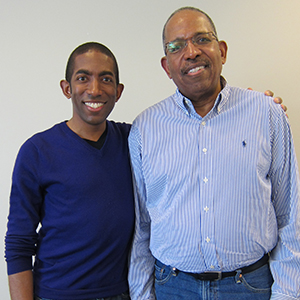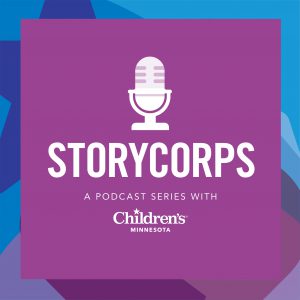Sickle Cell: Ed Jenkins III and Ed Jenkins, Jr.’s story


About this episode
Father and son discuss how sickle cell has impacted understanding of their family, and childhood experience.
Topics:
- Diagnosis
- Advice/messages
- Sickle Cell Crisis: Complications
- Resilience: Future
Transcript
Ed: Hello, my name is Ed. And I am the son.
Ed: Hi, my name is Ed. And I am the father.
Ed: So I have sickle-cell anemia, and I’ve had hemoglobin SC disease. I’ve had that all of my life and my experience with that. I would really like to know your perspective. I don’t know if we have every really talked about your journey through my living with and battling sickle-cell a lot. I know I feel like the focus sometimes is always on me in the sense of how is he doing. How am I holding up? I just never knew much about what you have gone through with it. What was maybe the first time you knew or you were told that I had that? What was that like for you?
Ed: Well, I think it was shortly after you were born actually. At that time, it was fairly early in testing for sickle cell anemia. I know when your sister was born, some four years prior to you, I know she was tested. That’s all I knew. She obviously did not have sickle-cell anemia. She had a trait. Your mom and I never thought much about that. Once you were born, I recall going to the clinic some weeks after you were born and the doctor indicating that you had SC disease, and that potentially you could have problems later in life. That’s when it probably struck me that we may have a challenge ahead of us, and also struck your mother as well.
Ed: my earliest memory of sickle cell I feel like was when I was playing outside with some neighborhood kids. We were playing some kind of tug-of-war game, and we were pulling each other’s arms and that kind of thing. I remember I was next in line, and I remember being pulled and we were having fun. I remember sister coming up, and she had to be about eight, and was like, ‘Stop it! Stop it! He’s going to get sick!’ No one really understood what that was. I felt like that night I had sickle-cell pain crisis. That’s the first time I remember. At that time, we didn’t even have a heating pad. I think I had some baby aspirin mom tried to have me to chew. She had some type of heating pack that you had to heat up on the stove. I remember that. It would always cool off. I would be complaining that I need another one to help. That heating pack from the stove helped sooth the pain. I always remember that being my first episode, but I guess you remember something even before then.
Ed: Exactly. One thing your mom and I realized is that the more you exerted yourself, it seemed like that just triggered sickle-cell crisis. We got to the point where when we had family gatherings, like the one you have just described, we would initially try to stop you from engaging and interacting with cousins and friends to avoid sickle-cell crisis. Later on, we learned that occasionally you were having such a great time, and I knew that everybody else goes home, they are tired, they sleep. You go to sleep and then most likely end up in the emergency room. It really became pretty predictable at that point.
Ed: I’m the only one in our family that has sickle cell, but I have some cousins that have traits?
Ed: As best we know some of your cousins, your sister has a trait, but by having a trait does not mean they will experience the effects of sickle-cell anemia. Obviously if both parents of their parents had sickle-cell traits, I think the probability is one in four of the child having the disease. To my knowledge, there are no other cousins or relative with sickle-cell anemia.
Ed: Let me ask you a question, from your perspective how has your mom and I helped you through this?
Ed: You both have been my role models. When I didn’t know what to do or how the pain was going to increase, I felt like you all really took great care for me. I never felt abandoned. I never felt that I was in it alone. I felt like you both were there and very strong. I think that’s the part of it I didn’t see very often you both feeling the discouragement or sadness of me. I didn’t really get that much, because I always felt like you were confident. ‘Ok, we are taking him to the emergency room. This is what he needs.’ I remember times where you guys were getting upset at the emergency room people, who didn’t give me the morphine that I needed. I remember some loud voices you know, something like that. I always felt that it was needed, because people wouldn’t be moving forward. I do remember once maybe mom crying or you crying when I was in the emergency room and didn’t know how you all felt about it. I can only imagine your child being there with IVs and oxygen and all the monitors and the pain, that can just be very very traumatic.
Ed: I have always looked at it is we have to play the hand that’s dealt us, and I must say you have done extremely well. You have taken something that is challenging that can be viewed negatively, and you have used it to move forward with the things that you want to do in your life. I am extremely appreciative and grateful having a son like you.
Ed: Thank you dad. I think that families with sickle cell have to have hope that things can get better. Things are getting better. The opportunity to try hydroxyurea, if that doesn’t work for their bodies try always moving forward. Even when you have that crisis and you are not feeling the best, don’t cancel going. Just try. I think is a valuable thing, because you don’t know on the other side of that what’s going to happen.
We wish to extend our thanks to the families who have shared their story here about the impact of living with hemophilia and sickle cell disease. We would also like to thank the many who worked on this project:
The Children’s Minnesota StoryCorps Legacy Team:
Eddie Gonzalez, Jocelyn Bessette Gorlin, Susan Kearney, Stephen Nelson, Margaret Heisel-Kurth, Stephanie Davis, Angela Blue, Elizabeth McDonough, Jill Swenson and Alisa Linne.
Special thanks to:
Stephanie Moua, Hamdi Hussein, Sadia Farah, Fatima Ali, Caillyn Costello, Suzanne Lehman, Suzan Ulrich, D'Ann Urbaniak Lesch, Justin Nelson, Allison Albright, Marvin Holmes-Leopold, Jose Rodriguez and Mitch Hare.
Minneapolis Institute for Production and Recording:
Jose Rodriguez and Mitch Hare.